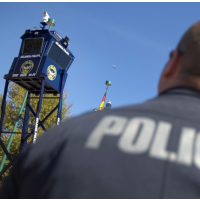Local Police Team with Charitable Foundations and Wealthy Donors to Keep Controversial Purchases in Shadows
 Atlanta police set up new surveillance tower (photo David Goldman, AP)
Atlanta police set up new surveillance tower (photo David Goldman, AP)
Using private foundations, some police departments in the U.S. have been able to buy things that aren’t subject to public discussion or vetting by elected official, according to a report by ProPublica.
When the Los Angeles Police Department in 2007 wanted to buy software that would allow the agency to connect information from crime reports with data swept up by license plate readers and surveillance cameras, it bypassed getting approval from the Los Angeles City Council, according to ProPublica. Instead, the Los Angeles Police Foundation sought a $200,000 donation from Target to buy the software produced by Palantir, a startup funded in part by the Central Intelligence Agency. The controversial technology, which allows users to track individuals with “unprecedented reach,” was then donated to the LAPD.
The reporting by ProPublica showed that this was hardly a unique situation. Foundation money has been used to buy not only the license plate readers, which indiscriminately sweep up information on the whereabouts of every vehicle they come across, but also Sting Ray devices, which track mobile phone usage over a half-mile radius.
New York’s police department has a similar foundation that has provided technology and equipment to the department. New York’s transparency on the use of foundation funds is almost non-existent—they’re listed in a lump as “non-city funds” on budget documents, with no clue what individual donations are being used for.
The American Civil Liberties Union (ACLU) is wary of these gifts of advanced spying and tracking gear to law enforcement agencies. “These technologies are adopted without any kind of public discussion, without clear policies on how they should be used,” Peter Bibring of the ACLU of Southern California told ProPublica.
Many of the donations to these foundations are made by companies that do business with the affiliated agency or hope to do so. When Motorola and Raytheon competed to win a contract to upgrade LAPD communications, both made large donations to the Los Angeles Police Foundation. Motorola went on to appoint William Bratton, who served as L.A. police chief until 2009, to its board in 2010. Motorola eventually won the LAPD contract.
“At least with public contracts and spending, there’s a facade of transparency and accountability,” Ana Muniz, who has studied LAPD’s gang policing units, said. “With private partnerships, with private technology, there’s nothing.”
Sometimes the items purchased are decidedly low-tech. The Los Angeles Police Foundation bought a horse from LAPD Officer Brandi Pearson, the daughter of Police Chief Charlie Beck, for $6,000, and then donated it to the department’s mounted unit.
Other departments around the country are turning to foundations to buy equipment and technology without public review. The Atlanta Police Foundation purchased surveillance cameras that are in place around the city, and it also bought the monitoring center that controls their use.
“No one really knows what’s going on,” said Dick Dadey of Citizens Union, a New York good government group. “The public needs to know that these contributions are being made voluntarily and have no bearing on contracting decisions.”
-Steve Straehley
To Learn More:
Private Donors Supply Spy Gear to Cops (by Ali Winston and Darwin Bond Graham, ProPublica)
Tanks on the Streets? Police Required to Use Military Equipment within a Year or Return It (by Noel Brinkerhoff, AllGov)
$4.2 Billion in Military Hardware Donations Fuels Militarization of U.S. Police Forces (by Danny Biederman and Noel Brinkerhoff, AllGov)
- Top Stories
- Unusual News
- Where is the Money Going?
- Controversies
- U.S. and the World
- Appointments and Resignations
- Latest News
- Trump to Stop Deportations If…
- Trump Denounces World Series
- What If China Invaded the United States?
- Donald Trump Has a Mental Health Problem and It Has a Name
- Trump Goes on Renaming Frenzy






Comments